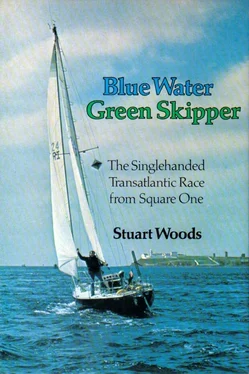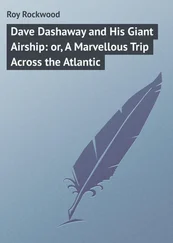At the boat show I had been delighted to find that the Multihull Offshore Cruising and Racing Association (MOCRA) had organized a race to Horta, in the Azores, for August 1975, the very time I had been thinking of sailing there. I signed up immediately. Now I went to see Bill King and asked if he’d like to come. He had not sailed at all since returning from his circumnavigation, but two years had passed and he must have been getting itchy for the sea. He accepted immediately. He would sail out with me and one or two other people and would hitch a ride home on another yacht while I sailed back single-handed. He also offered to come to Cork when the yacht was building and share his enormous experience. I was delighted.
That accomplished, I packed my things into a furniture van and moved to Drake’s Pool Cottage, Coolmore, Carrigaline, County Cork.

Driving back to the cottage from Carrigaline, about three miles away and the closest village, it occurred to me how isolated I would be at Drake’s Pool. The road to Coolmore wasn’t really on the way to anywhere, except Currabinny, and that just barely qualified as anywhere. I thought the isolation would be good for work on the novel but not so good for social life. Still musing on my remove from the rest of the world, I arrived at the cottage to find a Watchtower magazine on my doorstep. It seemed that, to the Jehovah’s Witnesses, nobody was isolated.
The following day I was sitting among my unpacked books, typing a letter, when two pretty girls appeared at the front door. Terrific! Not so isolated, after all! They turned out to be the Jehovah’s Witnesses. Still... I invited them in and we got into a hot religious discussion. I was annoyed by the ease with which they backed up their convictions with seemingly ambiguous quotes from the scriptures, so I dug a Bible from one of the tea chests and fenced with them for a bit. I scored no points in this debate. There was always a ready scriptural reference, there to be taken literally. Finally, I asked how they felt about sex — outside marriage, I meant. Oh, no. Against the rules, and a couple of suspect verses were quoted. I asked if they believed in a just God. Oh, yes, certainly. Well, I said, I didn’t think a just God would require me to remain celibate just because I had happened not to get married. They made an excuse and left.
Worth Newenham, my new landlord, and his wife turned up with a gift bag of turf for the fireplace and stayed for a drink. I asked where I might get a bookcase built in the neighborhood. Books follow me about relentlessly wherever I go, multiplying steadily. When I had left London for Ireland I had given most of my library away, but the few I had brought with me (only about four packing cases full) had done their multiplication trick. The cottage would not be livable until I got them out of the boxes and into a bookcase, a large bookcase. Worth suggested I talk with Nick Roe, who was living on an old trawler on a mooring in front of the cottage, rebuilding it. Nick Roe was to become a very important part of my project, before it was all done.
Nick stopped by later with his brother and girlfriend. They were all living on the boat, which was quite, quite large. Nick was very busy with his work, but he agreed to build the bookcase for me.
Gradually, things got unpacked, and I settled in. Ron dropped by now and then. I visited the boatyard, where the new factory for the series production was now complete and the first hull and deck was being molded. The factory looked good, and I felt more confident about the building of the boat. I had conversations about alterations to the boat with the production manager and with George Bush, who would be in charge of the extra work.
On the sponsorship front, I started with The Irish Times, perhaps the best of the Irish national newspapers. I had a meeting in Dublin with a member of their management and their advertising agency, and they expressed interest in sponsoring the project, perhaps in concert with another Irish company, yet to be found. I started looking. I tried Guinness first. They seemed a logical place to start, and through an acquaintance, they gave a logical reason for not sponsoring; they had cut back on all but existing sponsorship; they had just turned down a pub in Waterford for a trophy for their darts championship. They could hardly turn them down, then have the lads see on TV that they were sponsoring a yacht, could they?
To save time in explaining what I was doing, I wrote a description of the project and had copies run off. I began sending these to prominent Irish companies, since I intended being an Irish entry. A rule of the race stated that the nationality of the entry would be the nationality of the skipper. In December, when I had written to the committee formally reserving a place in the race, pending the qualifying cruise, I explained that although I was an American I had lived for some time in Ireland and had learned to sail there from Irish yachtsmen on Irish boats, and I requested that an exception be made and I be allowed to become an Irish entry. I had received a letter from the Royal Western Yacht Club saying that would be fine. Shortly after reserving my place I noticed an article in The Observer by yachting correspondent Frank Page, giving the number of entries by nationality. No Irish entry had been mentioned, and I dropped him a note saying that there would be an Irish entry, and since I was looking for Irish sponsorship, could he please say so sometime in his newspaper?
My race number of twenty-four was also confirmed. This number might pose something of a problem, since it had to be displayed on the sails, hull, and deck, and I was also entered for the MOCRA Azores race, which might assign me a different number. The problem was solved by asking MOCRA to make me entry number twenty-four in their race, and by asking the Irish Yachting Association for the sail number IR 24; both requests were granted.
The new two-tonner, which would be called Irish Mist II, was quickly taking shape at Southcoast. When introduced to Archie O’Leary, the owner, I offered to crew on any delivery trips he might be making when his own racing crew was not available. He promised to keep me in mind.
I found myself extremely busy, although my boat had not yet begun building. I was hustling about, ordering equipment and trying to ensure that it all arrived in time for the launching of the yacht; I was working hard on the sponsorship problem; I was writing to manufacturers, asking for discounts.
Also, I was negotiating with a publisher about a book describing the project. Ron was working on a book for Stanford Maritime, and he and his editor stopped by the cottage for a drink. After hearing about what I was doing, he expressed interest, and eventually we signed a contract. Finally, I still wanted to do some advertising work in Dublin.
I was trying to do all of this with no help whatsoever from the Irish Department of Posts and Telegraphs. In Galway it had taken me fourteen months to wrench a telephone from their grasp, and they had assured me that, as an existing subscriber, when I moved to Cork there would be no problem getting a telephone immediately. (The word “immediately” has no meaning in Ireland. It’s just a word.) However, when I arrived in Cork, although my application had preceded me by more than a month, nothing was happening. Finally, after weeks of telephone conversations (they never, never actually wrote any letters, although I would periodically receive a printed form telling me that my problem was being dealt with) they finally told me that nobody who lived more than a quarter of a mile from an existing telephone line could be provided with service, and that I lived 175 yards beyond that distance. Although I clawed my way through what seemed like the entire Irish Civil Service, the situation remained frozen for months.
Читать дальше













